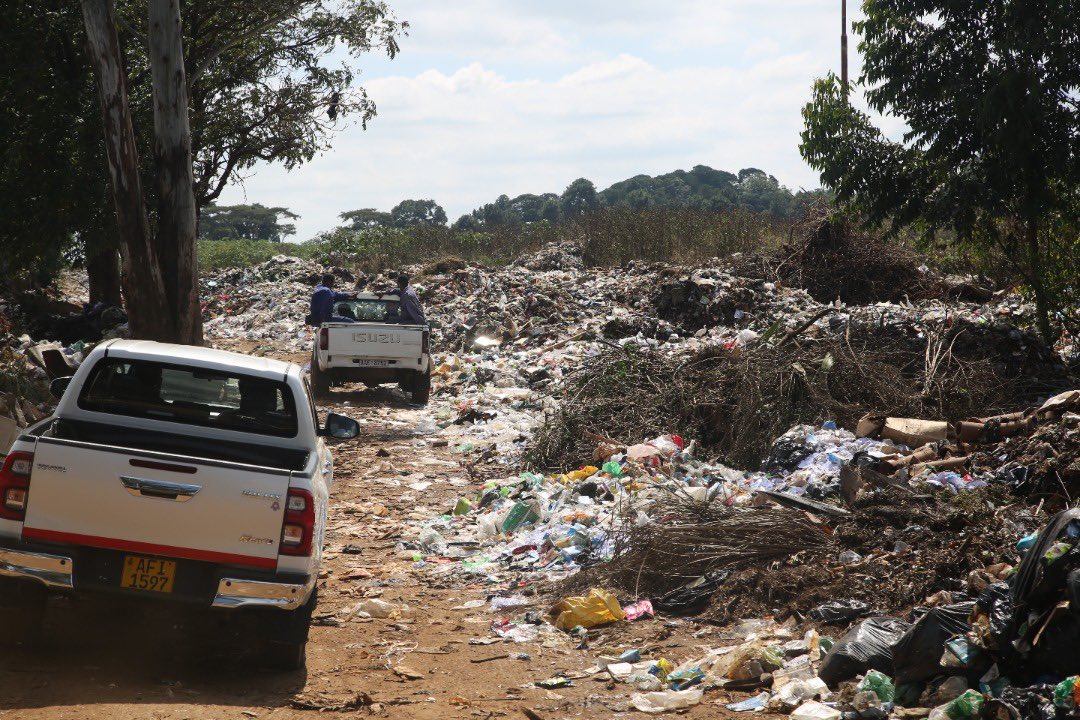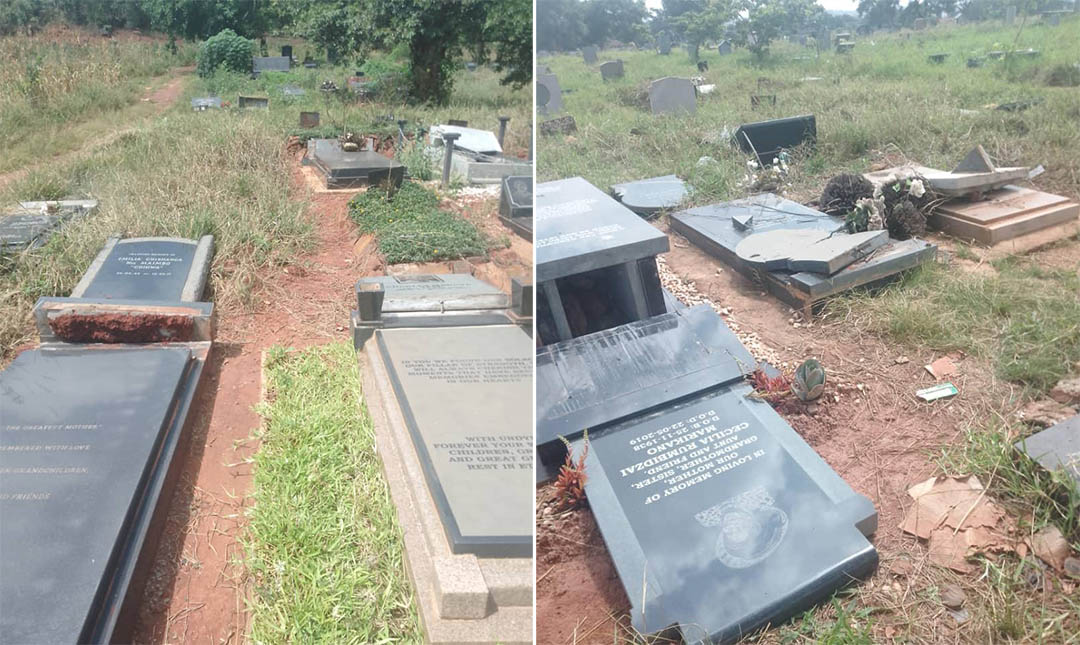The following is an extract from the founding affidavit by Harare North MP Alan Norman Markham in an application filed at the Harare High Court on April 26, 2022, challenging a decision by the City of Harare to award a US$344 million waste-to-energy contract to Geogenix BV, a company registered in the Netherlands and owned by Albanian Mirel Mërtiri, who is facing corruption allegations at home over a contract for an incinerator.
In Zimbabwe, Geogenix is fronted by Dilesh Nguwaya, a business partner of President Emmerson Mnangagwa’s twin sons, Sean and Collins. Nguwaya has a string of arrests for fraud and corruption.
On or about February 23, 2022, the joint Environmental Management, Finance and Development and Business Committee of the City of Harare held a meeting and inter alia recommended to full council to approve the signing of a Memorandum of Agreement for the Pomona Waste to Energy Project with Geogenix BV.
For the benefit of the Honourable Court, since 2016 the City of Harare has been looking for an investor to develop a waste-to-energy plant whereby waste at Pomona dumpsite and other dumpsites will be converted to energy. Pursuant to the aforesaid recommendation, the full council hastily convened a meeting on February 28, 2022, and purportedly adopted/approved the recommendation.
On or about March 7, 2022, the City of Harare and Geogenix entered into a Concession Agreement to Design, Build and Operate the Harare Pomona Waste Management Facility and Waste to Energy Power Plant, hereinafter called the contract.
I have established that the council meeting on February 28, 2022, was not properly convened and therefore a nullity. The meeting was convened pursuant to a special notice of February 28, 2022. However, as the minutes reflect, the council went on to hold an ordinary meeting as opposed to a special meeting. It goes without saying that the council could not have held an ordinary meeting as a consequence of a notice calling for a special meeting. The meeting was therefore illegal as no notice as required by the law was given to the councillors.
It is also notable that the date of the notice was the same date on which the meeting was held. This is improper as it did not afford enough time for councillors to prepare and attend the meeting. According to section 4(2) of the Harare (Proceedings of the Council) By-Laws, 1973, the notice of any meeting of the council “shall be delivered to the place of abode of each councillor or his usual place of business within the municipality, and, in the case of the notice of any ordinary meeting of the council, at least two days before such meeting.”
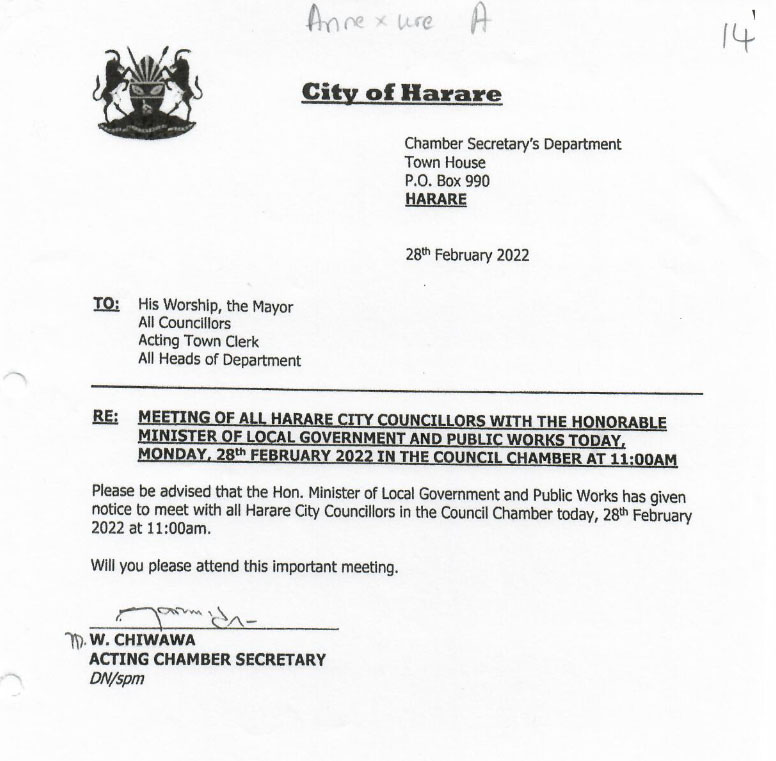
The minutes of the meeting of February 28, 2022, reflect that the meeting was an ordinary meeting. Accordingly, there was no compliance with the requirement of the notice period for an ordinary meeting. The notice period also failed to satisfy the minimum period for a special meeting, which is at least 24 hours according to section 84 (4) of the Urban Councils Act.
It is submitted further that although the minutes indicate that it was an ordinary meeting, I contend that this was in fact a special meeting called at the special request and instance of Local Government Minister July Moyo, as morefully appears from the notice itself. I am advised that according to section 84 (4) of the Urban Councils Act, no matters other than those specified in the special notice shall be discussed at that special meeting. However, as the minutes show, the councillors went on to hold an ordinary meeting where they discussed issues not specified in the special notice. The decision to adopt or approve the contract was not part of the notice of the special meeting and therefore could not have been made at the said special meeting.
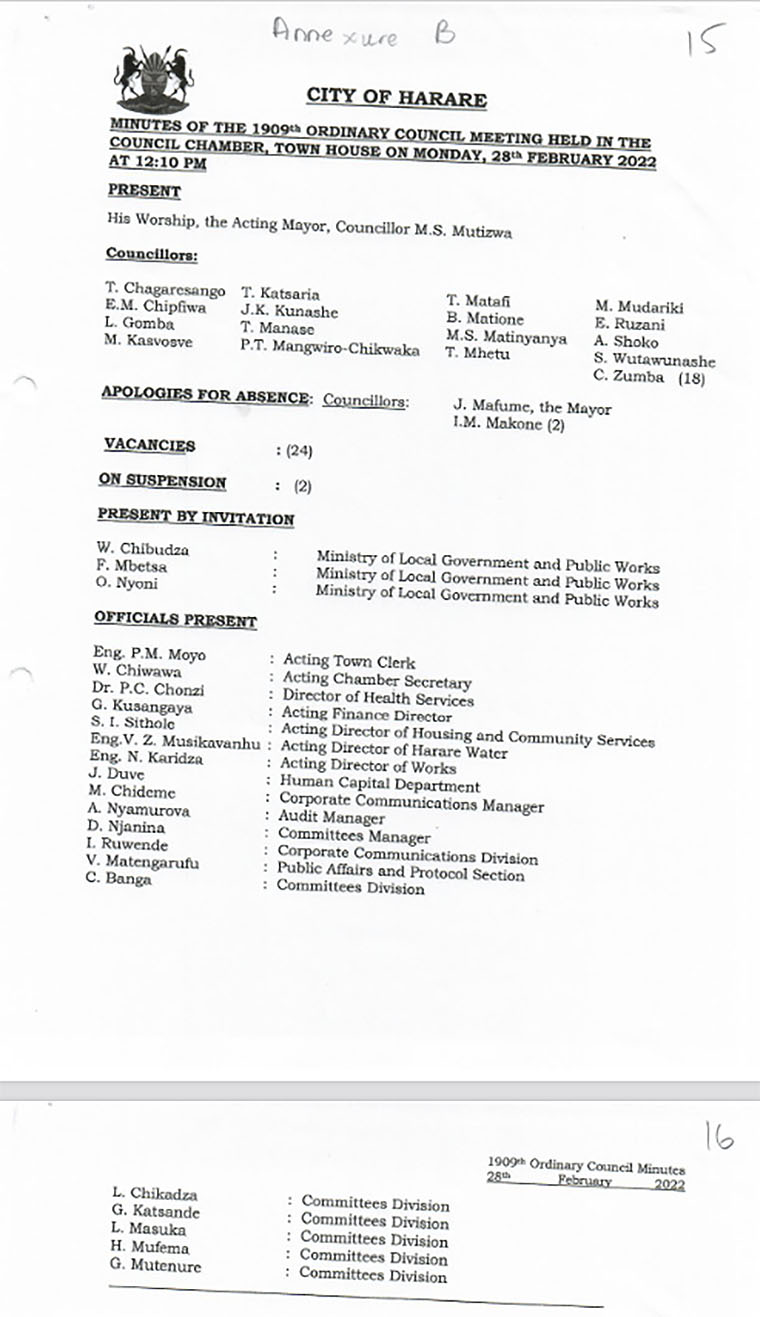
Further, the notice was also defective in that it did not specify the object or agenda of the meeting. It is notable that whereas the notice stated that minister Moyo had given notice to meet with councillors, he in fact did not meet or attend such meeting as purported by the notice. The notice was therefore misleading. The minutes of the meeting record that the councillors went on to hold an ordinary meeting without having received a proper notice of such ordinary meeting.
There is also indication that the special meeting was held without complying with other provisions of the Urban Councils Act. In this regard, I refer this Honourable Court to section 84 (5) (b) of the Urban Councils Act. According to the cited provision, a special meeting is held at such time and place that the mayor determines and no meeting is authorised to take place before 4.30PM in the afternoon unless two-thirds of the membership of the council have agreed that the meeting may commence earlier or in view of special circumstances the mayor has directed that the meeting commence earlier. The minutes reflect that the meeting was convened at 12:10PM and that there was no indication whatsoever why this was so.
Further, there is no evidence that this meeting was convened by the mayor Jacob Mafume. The minutes reflect that the meeting was chaired by the purported acting mayor, councillor Stewart Mutizwa. The minutes of the meeting of February 28, 2022, however confirms that the mayor is in fact Jacob Mafume who was said to be absent. I have verified that on this date, the substantive mayor was available and should have chaired the meeting as prescribed by the law.
Further, even if it is contended that the mayor was properly notified and absented himself from the meeting, which is denied, it is notable that the purported acting mayor was not elected by the councillors who attended the meeting as is reflected by the minutes. The minutes clearly reflect that Mutizwa simply chaired the meeting as a purported acting mayor. As the substantive mayor was available, there was no reason for an acting mayor to chair the meeting. The meeting was therefore improperly convened, constituted and conducted. Accordingly, the resolutions of the Harare City Council of February 28, 2022, were a nullity.
I also believe that the joint committee that met on February 23, 2022, and made the recommendation to council to approve or adopt the contract of Geogenix was not held in compliance with the provisions of the law relating to procurement processes.
The decision to approve the contract by and between the City of Harare and Geogenix was grossly unreasonable and irrational and extremely detrimental to the interests of the residents, stakeholders and ratepayers of the City of Harare. As the court will note, the contract creates serious financial obligations for the City of Harare to pay Geogenix in foreign currency (US$) for a period of 30 years. It is common cause that the City of Harare’s waste collection costs are actually in the local currency (RTGS) and there is a huge disparity in the exchange rates of the local currency and the United States Dollar.
The City of Harare does not have capacity to meet this obligation without falling deep into an intractable debt trap or resorting to other developmental funds. The cost of the project is unsustainable. According to Article 22.1 of the contract, at the commencement of the contract the City of Harare will pay to Geogenix a fee of US$40 per tonne. In terms of Article 22.3 of the contract, the City of Harare is bound to supply minimum guaranteed waste quantities. These are stipulated under Article 22.3.1 (a) to (e). According to this Article, irrespective of whether the City of Harare meets the minimum threshold of waste delivery to Geogenix, the company “… shall invoice and shall be entitled to receive an annual fee, which is the amount equal and not less than an amount equal to the Minimum Annual Guaranteed Waste Quantity (in tonnes), multiplied by the fee per tonne of waste (“Minimum Annual Guaranteed Service Amount”)”. Further to that according to Article 22.3.2: “The Payment of the Annual Minimum Guaranteed Amount shall not be contested or disputed by the City of Harare throughout the term.”
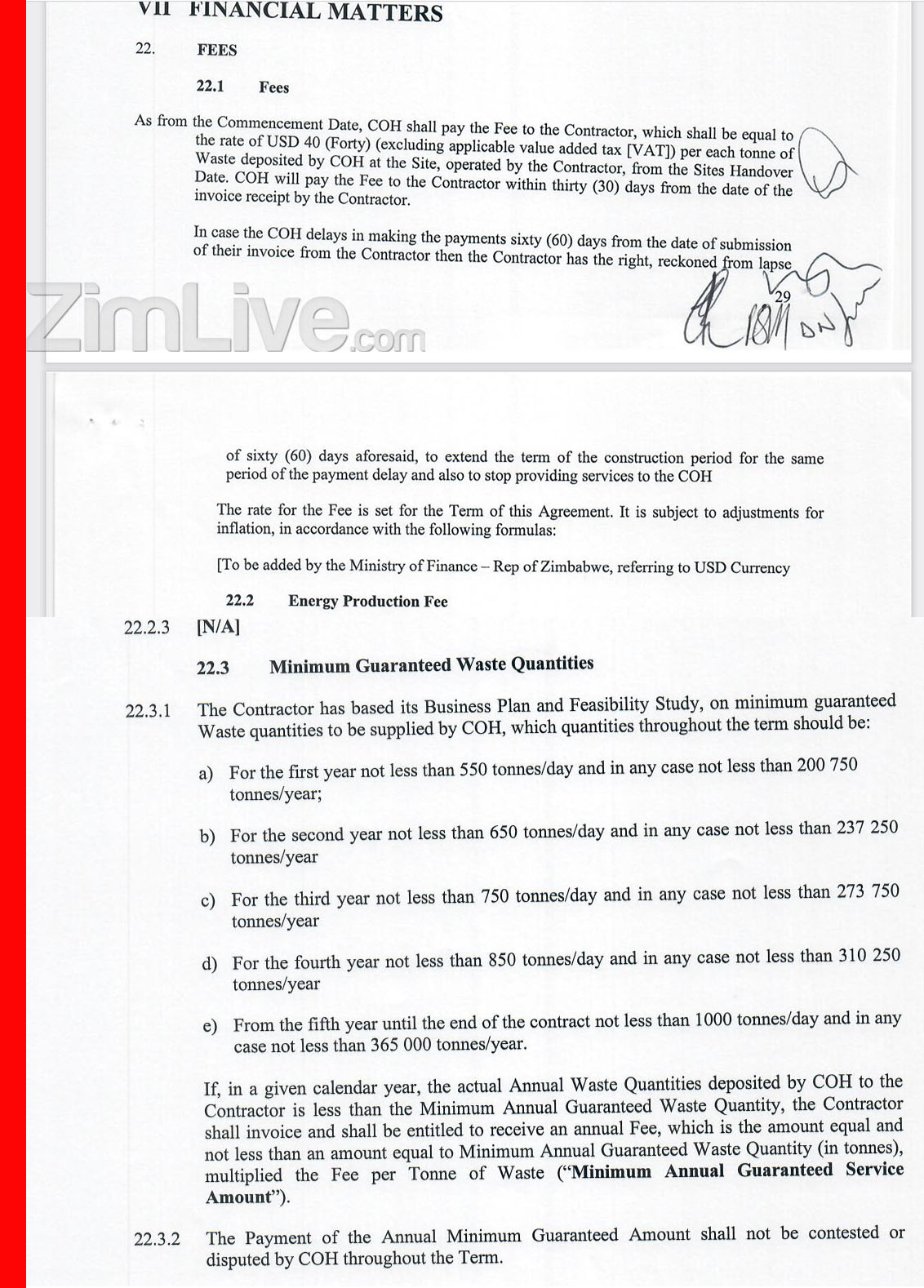
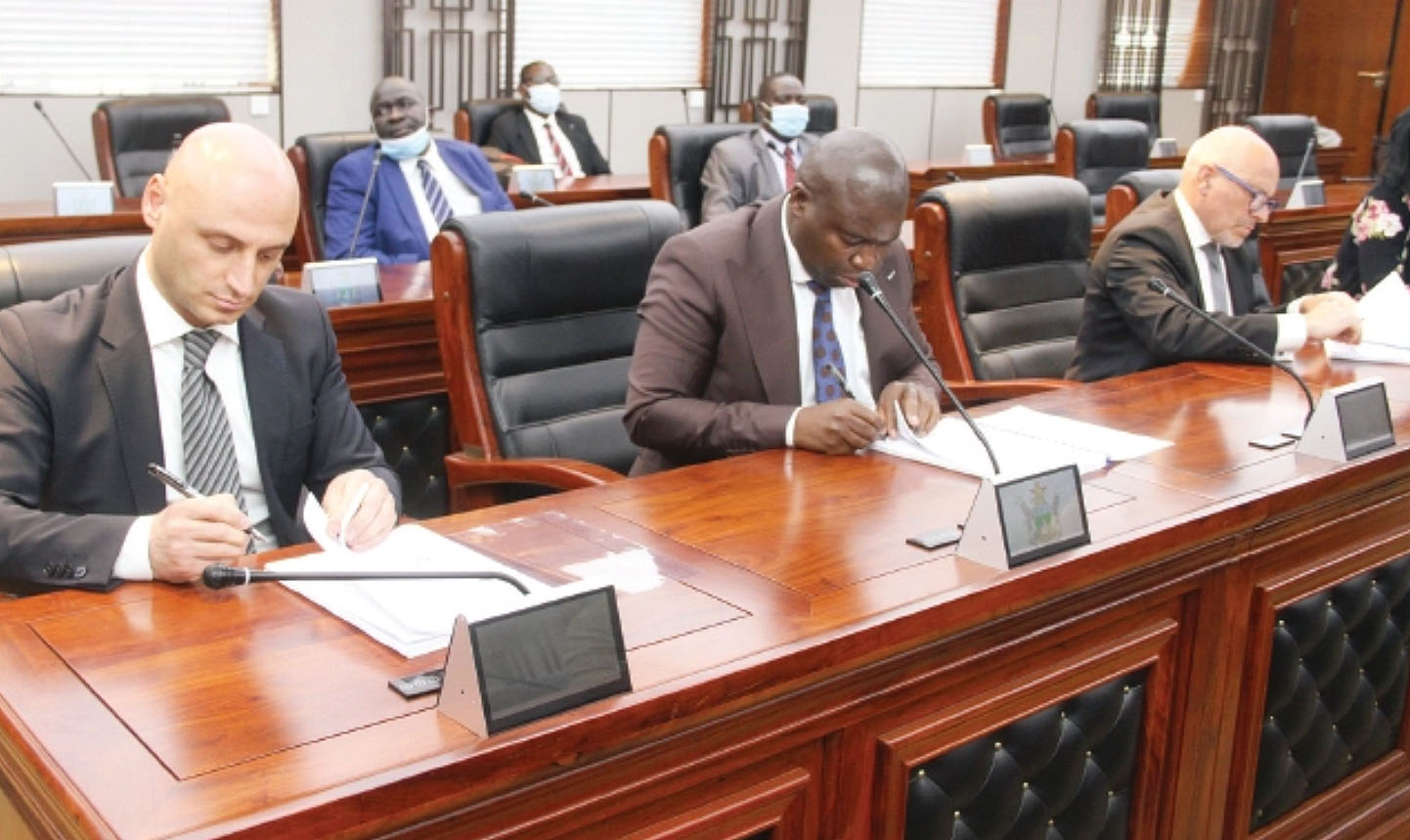
I have noted that according to the minutes of the meeting at page 13 of thereof, it is indicated that the government undertook to support the City of Harare through devolution funds to meet its financial obligations. If this is true, this is a blatant violation of the principle of devolution established by the constitution of Zimbabwe. I refer this Honourable Court to section 264 (2) (a) of the constitution which sets out the objectives of the devolution of governmental powers and responsibilities to provincial and metropolitan councils and local authorities as: “… to give powers of local governance to the people and enhance their participation in the exercise of the powers of the State and in making decisions affecting them.”
Minister Moyo, who is part of central government, cannot dictate how the funds for devolution are going to be used by the City of Harare as this clearly undermines the principle of devolution.
As a former councillor and a resident of Harare, I am privy to the fact that the City of Harare does not have capacity to meet the delivery of the minimum quantity of the waste in terms of the contract. This is because of a number of reasons including that it does not have enough trucks for waste collection and delivery. It is common cause that the City of Harare is currently failing to collect waste from several places in Harare due to shortages of trucks. I understand that currently the City of Harare has six working trucks. The implication of the City of Harare’s predicament is that it has no capacity to deliver the stipulated tonnage of waste and therefore the contract is set up to fail.
The failure of the City of Harare to deliver the required tonnage would however not excuse it from paying Geogenix. In fact, assuming that the City of Harare fails to perform its obligations, which is highly likely given its incapacitation, Geogenix may choose to terminate the contract and walk away with US$3.5 million for nothing. I refer this Honourable Court to Article 3.4 of the contract. It is therefore not an exaggeration to say that the contract is designed to fail on the part of the City of Harare, exposing it to an unnecessary claim from Geogenix running into millions of US dollars, which will be paid for from money generated from ratepayers and devolution funds. It is therefore grossly unreasonable for the City of Harare to have entered into this contract. It defies logic.
I also note that the City of Harare did not at all consult the residents, stakeholders and ratepayers, that is, interested parties before the contract was entered into. The contract places onerous financial obligations on the City of Harare which will be paid for by ratepayers. The contract is stipulated to be valid for 30 years. The City of Harare will pay US$40 per tonne to Geogenix. In the first year of the contract, the City of Harare is obliged to pay US$8.03 million. By the fifth year of this contract the figure would have risen to a minimum of US$14.6 million annually from the year 2027 until 2052.
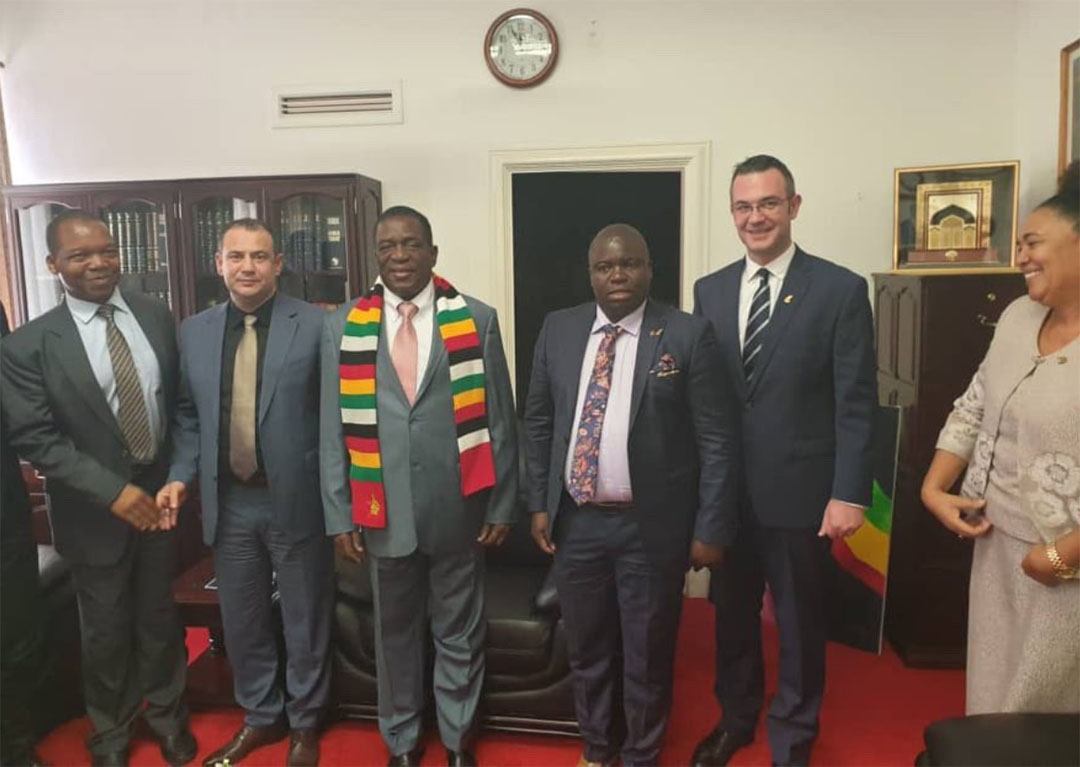
It is submitted that given the humongous financial liability incurred by the City of Harare for many years which has the potential of affecting service delivery, residents, ratepayers and other interested parties ought to have been consulted on this in line with good governance practices, transparency, accountability principles in the Constitution. According to section 264 (2) (d) of the constitution one of the objectives of devolution is to recognise the right of communities to manage their own affairs and to further their development. The City of Harare is thus obliged to consult key stakeholders, particularly ratepayers and residents on a material decision affecting them.
The action and/or decision of the Harare City Council to enter into a contract with Geogenix violated section 3(2)(a) and (b) of the Administrative Justice Act in that residents, stakeholders and ratepayers who stand to be affected by the decision were not given notice of the nature and purpose of the decision or a reasonable opportunity to make representations.
The decision was shrouded in secrecy and is not in the best interests of the affected parties. The failure to consult the residents on an issue which has serious financial implications for the City of Harare which might affect its operations and service delivery is a gross irregularity warranting this Honourable Court to step in and set aside the contract.
I am also advised that the City of Harare did not carry out its own independent feasibility study before deciding to enter into a contract with Geogenix. A reading of the contract suggests that the City of Harare solely relied on the feasibility study carried out by Geogenix, which however is an interested party. The City of Harare ought to have appointed a special committee in terms of section 100 of the Urban Councils Act to carefully investigate the feasibility of this contract and its implementation to enable the City of Harare to make an informed decision.
I have also established that Geogenix was given undue preference to do the waste project at the expense of other entities without going to tender. Previously, the City of Harare flighted a tender for waste management of the Pomona dump site and this was not followed through with the result that entities that participated in the tender process are still waiting for the outcome. A copy of the invitation to tender was published in the Government Gazette of November 2, 2018.
I also recall that sometime in 2016 when I was still a councillor, the City of Harare invited bidders for the Pomona Project, framed as ‘Request for Proposals, Expression of Interest for: Establishment of a Waste to Energy Plant for Pomona Landfill Site Through a Public Private Partnership.’
I therefore believe that fraud, corruption or favour was shown to Geogenix on irrational grounds. I note that the meeting of the council was held at the special instance and request of July Moyo who is the responsible minister and I believe that this exerted a lot of pressure, duress and undue influence on councillors to make a grossly unreasonable decision. It goes without saying that the failure to go through a proper tender process not only prejudiced other participants but potentially prejudiced the City of Harare as a cheaper and efficient bid might have been considered.

Further, I do not believe that the City of Harare was and is able to meet one of the most essential requirements of the City of Harare to be awarded projects of this nature, that is, the requirement to show that it has funding to implement the project. I believe that Geogenix has no financial capacity to fund this project and I challenge it to prove otherwise.
I therefore submit that the decision and manner in which the City of Harare conducted itself in the approval and signing of the contract with Geogenix was improper. In addition, I also submit that the decision of the City of Harare was not efficient, reasonable, impartial and was not substantively and procedurally fair within the contemplation of section 68 (1) of the Constitution of Zimbabwe.
RELIEF SOUGHT
I hereby seek that the resolution by the City of Harare to enter into a contract with Geogenix BV be set aside and the consequential relief that the contract subsequently signed by and between the City of Harare and Geogenix BV be declared a nullity and to be on no force or effect.
